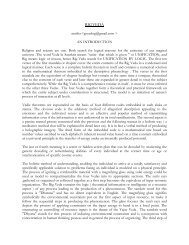The Illustrated Encyclopedia of Hindusim vol 2
You also want an ePaper? Increase the reach of your titles
YUMPU automatically turns print PDFs into web optimized ePapers that Google loves.
Shakuntala<br />
filled with pity, takes a form with one<br />
hundred eyes, because <strong>of</strong> which one <strong>of</strong><br />
her epithets is Shatakshi (“hundred<br />
eyes”). From each eye comes a stream<br />
<strong>of</strong> tears, and when these fall to the<br />
earth, plants begin to grow again.<br />
Further, when her tears do not reach<br />
some places, she puts forth vegetables<br />
(Shak) from her own body to nourish<br />
the creatures <strong>of</strong> the earth. Her final<br />
action is to kill the demon Durgam,<br />
reasserting the Goddess as a strong<br />
and protective figure. Although there<br />
is little information on Shakumbhari<br />
Devi in English, there are further references<br />
to her in David R. Kinsley, Hindu<br />
Goddesses, 1986. See also pitha.<br />
Shakuni<br />
In the Mahabharata, the later <strong>of</strong> the<br />
two great Hindu epics, the maternal<br />
uncle <strong>of</strong> Duryodhana, the epic’s<br />
antagonist. Shakuni’s most famous<br />
episode in the Mahabharata is as a<br />
player in the game <strong>of</strong> dice against<br />
Yudhishthira, the eldest <strong>of</strong> the five<br />
Pandava brothers who are the epic’s<br />
protagonists. <strong>The</strong> epic describes<br />
Shakuni as the world’s best dice player,<br />
whereas Yudhishthira is enthusiastic<br />
but completely unskilled. As<br />
Yudhishthira begins to lose, he keeps<br />
betting bigger and bigger stakes in an<br />
effort to win back what he has lost.<br />
After losing his family’s kingdom and<br />
all their possessions, Yudhishthira<br />
wagers himself and his brothers, and<br />
after losing this bet, he wagers and<br />
loses their common wife, Draupadi.<br />
As a result, Draupadi is paraded<br />
through the assembly hall by<br />
Shakuni’s nephews, Duryodhana and<br />
Duhshasana, her clothes stained<br />
with her menstrual blood, sharpening<br />
the already strong enmities between<br />
these two groups. Shocked at such<br />
treatment, Duryodhana’s father, King<br />
Dhrtarashtra, gives the Pandavas<br />
back their freedom. <strong>The</strong>n, because <strong>of</strong> a<br />
loss in a subsequent game <strong>of</strong> dice, the<br />
Pandavas agree to go into exile for<br />
twelve years and live incognito for the<br />
thirteenth, with the condition that, if<br />
they are discovered in the thirteenth<br />
year, the cycle will begin anew. In the<br />
ensuing Mahabharata war Shakuni<br />
fights on the side <strong>of</strong> his nephew and is<br />
eventually killed by the fourth<br />
Pandava brother, Sahadeva.<br />
Shakuntala<br />
A figure in Hindu mythology and the<br />
protagonist in the drama Abhijnanashakuntala<br />
written by the poet<br />
Kalidasa. Shakuntala is the daughter<br />
<strong>of</strong> the apsara Menaka and the sage<br />
Vishvamitra, conceived when Menaka<br />
is sent to seduce Vishvamitra in an<br />
attempt to reduce his spiritual powers.<br />
Shakuntala is raised at the ashram <strong>of</strong><br />
the sage Kanva, where she grows into a<br />
beautiful young woman. One day she<br />
attracts the eye <strong>of</strong> King Dushyanta,<br />
who has been hunting in the forest,<br />
and they are married by the gandharva<br />
form <strong>of</strong> marriage (consensual sexual<br />
intercourse), conceiving their son<br />
Bharata. Shakuntala’s happiness,<br />
however, is short-lived. As she is thinking<br />
one day about Dushyanta, who has<br />
traveled back to his capital without<br />
her, she fails to notice the arrival <strong>of</strong> the<br />
sage Durvasas. In his anger at being<br />
ignored, Durvasas lays a curse that her<br />
beloved will completely forget her.<br />
Shakuntala, horrified, manages to<br />
convince Durvasas to modify the<br />
curse: Dushyanta will remember<br />
everything, as soon as Shakuntala<br />
shows him pro<strong>of</strong> <strong>of</strong> their union.<br />
Shakuntala has Dushyanta’s signet<br />
ring as pro<strong>of</strong>, but she loses it on her<br />
way to see Dushyanta. Dushyanta (as<br />
expected) denies that he has ever met<br />
Shakuntala, and she eventually ends<br />
up working as one <strong>of</strong> the palace cooks.<br />
Her salvation comes unexpectedly,<br />
when she finds the missing ring in the<br />
belly <strong>of</strong> a fish she is preparing for the<br />
king’s dinner. When she shows him the<br />
ring, Dushyanta immediately recognizes<br />
Shakuntala and acknowledges<br />
her as his wife, and the couple live<br />
happily ever after.<br />
621

















